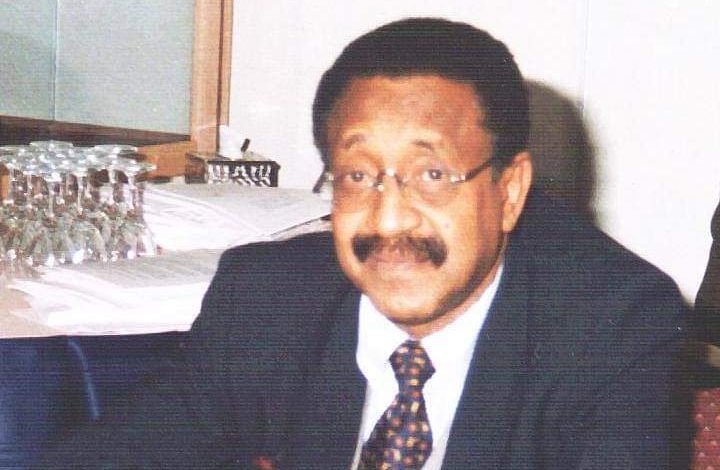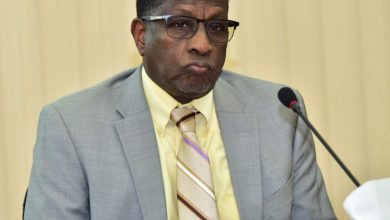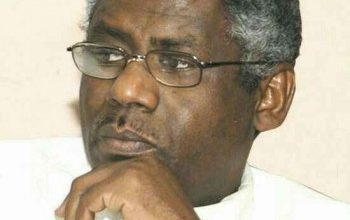Competition for Platforms: What Will be the Fate of the Negotiated Solution?

Al-Wathiq Kameir
kameir@yahoo.com
Toronto, February 1, 2024
While the Sudanese are heavily suffering from the fire of a bloody war that is destroying everything on land, negotiating platforms are competing, mediators are competing, and heads of some countries are competing to lead the negotiating process in an attempt to search for a solution that will achieve political gains for them. In this article, I aim to review this competition for negotiating platforms, present its topics and agenda, and the reasons for its failure to achieve tangible progress towards stopping the war, and present a vision for a negotiated solution not only to stop the war, but also with the aim of ending it by addressing and its main causes.
Less than a month after the outbreak of the April War, joint mediation between the United States and Saudi Arabia succeeded in bringing together two delegations of the Army and Rapid Support Forces (RSF) in Jeddah to negotiate an end to the war. On May 11, 2023, the two parties agreed to a declaration of principles and specific obligations governing the negotiation process. The declaration set the negotiating agenda with the aim of protecting civilians and reaching a short-term ceasefire to facilitate the delivery of humanitarian aid and the restoration of basic services, with a commitment to scheduling subsequent expanded discussions to achieve a permanent cessation of hostilities. Perhaps most importantly, the declaration stipulates in its second clause that commitment to the declaration will not be linked to engagement in any political process.
However, the negotiations faltered and did not succeed in achieving any of these goals until the Kingdom of Saudi Arabia and the United States of America announced the suspension of negotiations between the two parties to the conflict in Sudan, on June 2, 2023. After stopping for more than 4 months, negotiations between the army and the Rapid Support resumed on October 26, 2023 under the auspices of US-Saudi mediation, where they were joined on this tour by a representative of the African Union and the Intergovernmental Authority for Development (IGAD). Less than two weeks later, on November 7, the two parties signed commitments to deliver humanitarian aid, confidence-building measures, and a ceasefire, in preparation for reaching a permanent cessation of hostilities. However, this second round of talks did not succeed in making any progress on the path to stopping the war until the mediation officially announced on December 4, 2023, the suspension of negotiations indefinitely.
IGAD incursions and platforms compete
In my opinion, the collapse of the Jeddah talks, and the transfer of the dossier to IGAD, is mainly due to the combination of several intertwined and closely related factors, most notably the inclusion of political issues on the negotiating agenda. This is despite the fact that the mediation, at the start of the second round negotiations, urged the two sides of the war to “resume what was agreed upon in the Jeddah Declaration,” and stressed that “the talks will not address issues of a political nature” (Saudi Ministry of Foreign Affairs press release, October 29, 2023). Among the confidence-building measures is asking the Sudanese army to detain those escaping from prisons (arresting the leaders of the National Congress), and to take measures against the parties provoking escalation and fueling the conflict. This is a demand with a political dimension that is not consistent with the agenda of the Jeddah Declaration. A second factor lies in the participation of IGAD and the African Union in this round of negotiations and motivating IGAD (in the presence of the organization’s Executive Secretary, Rqnna Qebeho himself) to exploit the situation in order to seize the negotiation dossier. Since the Government of Sudan’s rejection of the African Union and IGAD roadmap in late May 2023, and Kenya’s chairmanship of the “Quartet” committee to discuss the Sudanese crisis in the context of the IGAD initiative, and its threat to withdraw from the organization, IGAD’s resolve has not wavered during the cessation of the Jeddah talks (June-November 2023) to regain its sponsorship for negotiations.
Also, on the other hand, the winds came as desired by the IGAD ships following the visit of the President of the Sovereign Council, Commander-in-Chief of the Army, to Nairobi and his meeting with the Kenyan President, William Ruto, and his meeting with the Ethiopian Prime Minister, Abiye Ahmed, in mid-last November, in order to overcome the obstacle of the IGAD Quartet, which was previously rejected by the Sudanese government, considering that the Kenyan president’s position is not neutral, but rather biased towards the leader of the RSF militia. Then came his visit to Djibouti, during which the President of the Sovereign Council presented to the Executive Secretary of IGAD his request to hold an emergency summit to discuss stopping the war and resolving the crisis.
It is as if IGAD was counting the seconds to take control of the issue of war and peace in Sudan. As soon as the mediation announced, on December 4, 2023, the suspension of negotiations indefinitely, IGAD called for an extraordinary summit meeting in Djibouti on December 9, in what appears to be a bypass of the Jeddah platform, it was agreed in Djibouti to distribute the roles between IGAD and the African Union, so the organization will carry out the mission of: stopping the war, including the delivery of humanitarian aid, to achieve a permanent cessation of hostilities, which is the main agenda of the Jeddah platform, while the political process is entrusted to the African Union and the “Extended Mechanism for Resolving the Crisis in Sudan,” which was established at the ministerial session for Sudan on April 20, 2023. The summit’s call for a face-to-face meeting between the Commander-in-Chief of the Army and the Commander of the RSF aimed to create a political process in which the RSF and the political forces, represented by Coordination of democratic civil forces “Taqaddum”, in light of the demands of these forces to participate in the negotiations. Establishing the negotiating and political process on this planned meeting was the straw that broke the back of the IGAD platform after the organization failed to arrange it, which created tension between it and the Sudan government, which refused to participate in the Entebbe summit, January 18, and then Sudan froze its membership in IGAD after the invitation was extended for RSF Commander to attend the Presidents’ Summit (as if the IGAD leadership responded to the RSF requirement for a meeting with the Commander-in-Chief of the Army in the presence of the heads of state and government of IGAD and international and regional organizations).
It is important to note that the relationship between the African Union (AU) and IGAD is governed by the law of subsidiarity, which is a (customary) principle according to which regional or sub-regional actors such as the African Union or IGAD should lead conflict resolution efforts. In the case of Sudan, the matter comes to IGAD by virtue of its membership in the AU. However, the African Union has a space in which to move, even if it is far from the attention and focuses on Sudanese civilians. Thus, the AU’s communication with some political and societal forces was not interrupted. Rather, the President of the Commission engaged in intensive meetings with all parties of the political, civil and social forces and armed movements in Cairo in the period extending between July and October 2023, during the cessation of the Jeddah talks. The AU did not exclude from these consultations representatives of the RSF, in addition to those it described in a statement as “the pillars of the ousted regime in 2019,” despite the cross-cutting objections to the involvement of the RSF and Islamists. Ironically, IGAD invited a delegation from the Coordination of Democratic Civil Forces (Taqaddum) to meet with the heads of state and government at the Entebbe summit, which reflects a noticeable conflict in the two institutions’ approaches to approaching the political negotiated solution, and may challenge the credibility of the neutrality of the entire mediation. Evidence of this conflict, or weak coordination, is the announcement by the Chair of the African Union Commission (January 17) to appoint a high-level mechanism of three prominent African figures to work on settling the armed conflict in Sudan. The irony is that the announcement of the appointment of the mechanism was issued only one day after the government’s decision to “stop engaging and freeze dealing with IGAD regarding the current crisis dossier in Sudan, on January 17, 2024. It is also ironic that the African Union Commission announced its tripartite mechanism while all countries were waiting for IGAD to name its special envoy for Sudan according to the decisions of the 41st Extraordinary Summit in Djibouti, on December 9 of last year.
The competition of platforms was not limited to Jeddah, IGAD, and the African Union. There are other countries in the region that are not members of IGAD, specifically Egypt and Chad, which are influential and affected by the war in Sudan and bear the largest repercussions of the military conflict due to the heavy influxes of refugees. This exclusion from the negotiating platforms and the feeling of absence, which is a legitimate feeling, prompted the two countries to cooperate together and agree on another formula that they called the “Neighboring Countries Initiative.” Cairo hosted the first summit of these countries in mid-July 2023 and was attended by all the countries of the region, including the Central African Republic and Libya. There is no doubt that Egypt is a regional player that cannot be ignored in matters related to Sudan, so one of Egypt’s main priorities is to reaffirm its presence in a dossier from which it feels excluded as a result of other regional efforts. However, with the exception of the meeting of foreign ministers of neighboring countries in N’Djamena during the first week of August, the initiative failed to create an effective follow-up mechanism and due to differences in positions between Egypt, on the one hand, and Ethiopia and Chad, on the other hand, it died in its infancy.
In the context of competing negotiating platforms, despite the acceptance of the Jeddah Platform mediation partners to transfer the talks to IGAD, the Kingdom of Saudi Arabia appears keen to restore the Jeddah Platform, as demanded by its Deputy Foreign Minister in his speech before the IGAD Summit in Entebbe, on January 18, 2024. As stated by him, “Implementing the Jeddah Declaration and committing to protect civilians in accordance with the principles of international humanitarian law and human rights principles is the way to resolve the current crisis in brotherly Sudan, and that Saudi Arabia believes that the Jeddah platform and the results it has achieved have received the support of the Sudanese people and great international support, which has encouraged the resumption of” “Jeddah 2 talks” with the participation of a representative of the African Union and IGAD.
A conclusion was reached at the same wavelength; the level of negotiation platforms moved from the regional community to the international space with the entry of the United Nations despite the organization’s awareness of its exclusion from leading any negotiation by virtue of the principle of “subsidiarity,” according to which the task of resolving conflicts falls to the IGAD and the African Union. If the efforts of the Jeddah Platform, IGAD, and the African Union, and the “forgotten” initiative of neighboring countries, did not succeed in stopping the war, it was necessary for the personal envoy of the Secretary-General of the United Nations, Ramtane Lamamra, to present a new vision regarding the negotiating platform, even if he needed time to complete his consultations with all stakeholders interest until his initiative becomes public. In the words of the Personal Envoy at the Entebbe Summit, “The Secretary-General and I are convinced that there is a need for a unified and coherent international mediation process that harnesses the resources and approaches of our organizations to help the Sudanese end this brutal war. I hope that we can discuss how this process can be used to build on existing efforts.”
Conclusion: What is the fate of the negotiated solution?
The lack of a coherent regional or international approach to negotiation makes this competition and rivalry for platforms an obstacle to any negotiated solution that leads to stopping the war, let alone ending it and achieving sustainable peace through a comprehensive foundational political process. The subject of this competition is not only over the negotiation venue, but also over the negotiation agenda and its ultimate goal, as long as the parties to the negotiations are identified and defined: the army and RSF. The Jeddah Declaration specified the negotiation topics to be about reaching a short-term ceasefire to facilitate the delivery of humanitarian aid and the necessary measures leading to a permanent cessation of hostilities, without the declaration being linked to engaging in any political process. In the meantime, IGAD designed a political negotiation process based on a face-to-face meeting between the Commander-in-Chief of the Army and the Commander of the RSF, while summoning the leadership of the Democratic Civilian Forces Coordination Alliance (Taqaddum), which signed a declaration of principles with the Commander of the RSF, in the same steps as the framework agreement that did not reach its logical conclusions. .
It is true that IGAD was successful in sponsoring and facilitating the Comprehensive Peace Agreement between the Government of Sudan and the Sudan People’s Liberation Movement (SPLM) in Naivasha in 2005, and the Peace Agreement for South Sudan in Khartoum in 2018. However, the organization would not have succeeded in both experiences without the presence of a strong state and possessing influence and pressure on both sides of the conflict, IGAD was entrusted with leading the mediation efforts, Kenya in the first case and Sudan (with the blessing of Uganda) in the second experience. Currently, the countries of the region lack a unity of position, in light of blatant regional and international entanglements, and the absence of a state qualified to lead mediation, in addition to the conflicting interests of these countries, whose leaders are personally competing to lead the peace process to achieve private political gains.
The inability of Sudanese political elites to propose solutions to the armed and political conflicts that erupted after independence made the use of external, regional and international mediation commonplace. If this assistance is unavoidable, then any external mediation must support the development of projects for solutions for the Sudanese, instead of imposing solutions specific to the interests of its countries.
Success will not be achieved for any negotiated solution that leads to sustainable peace through regional or international mediation without designing a negotiating process that does not mix the cards and is based on achieving two interrelated goals: stopping and ending the war. Stopping the war is achieved through negotiations between the army and the RSF regarding military and security arrangements to resolve the issue of forming a single national army with unified command, a professional army that excludes the presence of any political organization within it, and is subject to reform and development, together with the rest of the security sector agencies, and accommodates the diversity and multiplicity with which the country totally abounds. The negotiating agenda to achieve this goal includes military measures that separate forces, stopping hostilities, opening paths for the delivery of humanitarian aid, and a map and mechanisms for the process of forming a single army and its time frame. As for ending the war and sustaining peace, it is achieved by diagnosing and addressing its causes by initiating a foundational political process in which all political, societal, civil, youth, and civil forces, resistance youth, women’s organizations, armed struggle movements, and national figures and leaders of public opinion participate with the aim of participating and involving everyone (except for those who committed crimes and corruption in designing this process until reaching the holding of the National Constitutional Conference, which addresses the issues of the establishment and the constitution.
In order to avoid the competition of mediations and negotiating platforms, the Jeddah platform remains the most qualified to sponsor negotiations on stopping the war and to commit to the declaration of principles governing the negotiating process, facilitated by Saudi Arabia and America, and in coordination between them and the African Union and neighboring countries, especially Egypt, South Sudan and Eritrea, in implementing the technical procedures related to the arrangements and wish leading to the formation of a single national army. As for the sponsorship of the founding political process, it falls to the African Union, which was originally agreed upon at the extraordinary summit of the heads of state and government of IGAD in Djibouti, in addition to the fact that the Chairman of the Union Commission had previously initiated meetings with multiple political, civil and societal forces, and even appointed a high-level tripartite mechanism to work with all Sudanese stakeholders, all civilian forces, warring military parties, and regional and global actors, including IGAD, the United Nations and the League of Arab States, to ensure a comprehensive process to restore peace and stability in Sudan. In my opinion, referring the political dossier to the African Union, whose membership includes stakeholders from all IGAD member states and neighboring countries, will reassure everyone and pave the way for progress in negotiations. The African Union can also activate and structure the “Extended Mechanism for Resolving the Crisis in Sudan,” which was established at the ministerial session for Sudan on April 20, 2023, and which includes, in addition to the African Union Commission and IGAD, a number of countries concerned with Sudanese affairs, and regional and international organizations, as well as neighboring countries, in addition to African countries members of the Security Council.


